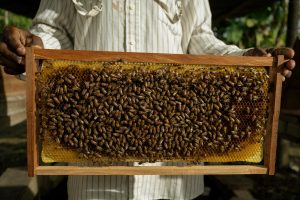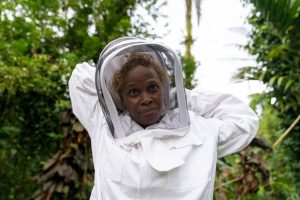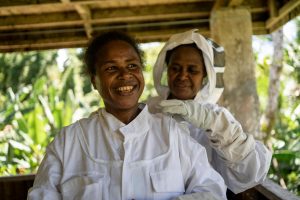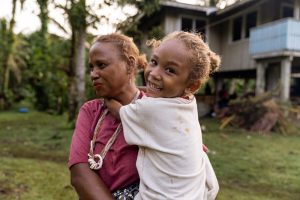Bees join the fight against climate change
In remote communities in the Solomon Islands, tens of thousands of tiny, buzzing climate champions are helping to restore protective ecosystems and rebuild families’ incomes. Save the Children and local organization Mai-Ma’asina Green Belt have launched an innovative program that transports honeybees from the capital city into isolated rural communities throughout the island. These bees, though small, are a huge and important aspect of the fight against climate change.

Creating long-term, sustainable change
The project trains local farmers, particularly women and young people, to care for the bees and diversify their income by producing honey to sell at local markets. In turn, the bees pollinate the vital mangrove trees and help them grow. The mangrove trees are essential to the islands because they produce food, act as natural buffers against cyclones and storms, and protect coastal areas. They even store carbon deposits that don’t make their way into the atmosphere, effectively slowing climate change globally.
Solomon Island is one of the most vulnerable places in the world, with rising sea levels and other extreme weather events, including floods and cyclones. With around two-thirds of people living within one kilometre of the coast, children and families are extremely vulnerable to these kinds of extreme weather events. Crops are often affected, which impacts access to food in rural communities. Sadly, Solomon Island has contributed very little to global carbon emissions yet is on the frontlines of the climate crisis.
Buzzing bees help families

Alison*, a mother of six who lost her home due to extreme weather, is one of the 74 people who have taken training on beekeeping and honey production. Alison was initially scared of bees, but by the end of the training, which included how to keep safe, she was looking forward to having a new source of income. “The first time I saw honeybees coming out of the box, I was very frightened. I wanted to run away. I wanted to watch from a distance. With honeybee training, I know if I do it well, I will be able to earn money for my family,” says Alison. With her new source of income, Alison can pay for her children’s school fees and give them opportunities to thrive.

Alison’s four-year-old daughter, Lucy, also took part in some of the training to learn more about bees, climate change, and children’s rights. The climate crisis is a child rights crisis, and to put children’s rights at the heart of climate action, we must ensure that they are able to actively participate in projects that also impact them.
We can’t immediately stop climate change but by thinking differently and making connections like the project in Solomon Islands, we can help children and families adapt and stay safe through the storms ahead.

Save the Children has had a presence in Solomon Islands since 1986 delivering essential child protection, health, education, and disaster risk reduction programs. Save the Children works with Pacific governments, including Solomon Islands, Fiji, Papua New Guinea and Vanuatu, to make schools safer for children during disasters, and helps children and their families prepare for disasters and recover afterwards.
To learn more about Save the Children’s work linked to the climate crisis click here.
*names changed for privacy


